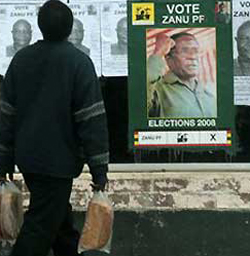 The situation has further been worsened by the fact that political leaders in Zimbabwe are acting with a lot of impunity and this has limited the ability of some of the commissions to effectively carry out their roles as defined under Chapter 12 of Zimbabwe’s Constitution.
The situation has further been worsened by the fact that political leaders in Zimbabwe are acting with a lot of impunity and this has limited the ability of some of the commissions to effectively carry out their roles as defined under Chapter 12 of Zimbabwe’s Constitution.
This came out during deliberations at a Dialogue and Transition in Zimbabwe policy conference hosted by Crisis in Zimbabwe Coalition (CiZC) and the Zimbabwe Democracy Institute (ZDI) in Harare on October 27, 2016.
Chapter 12 of Zimbabwe’s constitution established the Zimbabwe Electoral Commission (ZEC), the Zimbabwe Human Rights Commission (ZHRC), the Zimbabwe Gender Commission, the Zimbabwe Media Commission (ZMC) and the National Peace and Reconciliation Commission (NPRC).
The roles of the Commissions include supporting and entrenching human rights and democracy, to promote constitutionalism, transparency and accountability as well as ensuring that injustices are remedied.
Heal Zimbabwe Trust representative, Cleto Manjova, in his presentation at the policy conference expressed concern that politicians were deliberately incapacitating the independent commissions for selfish gains.
“We have independent commissions but there is a deliberate ploy by some politicians to ensure that they do not become effective. Accountability is important to enable people to benefit from the social contract but we note with concern that there is no accountability by those holding power,†said Manjova.
Zimbabwe Human Rights NGO Forum Director, Lloyd Kuvheya said Zimbabwe needed “strong institutions that are accountable and responsive to the needs of the peopleâ€.
“The Zimbabwe Anti -Corruption Commission has failed to deliver due to political interference and we have witnessed people in the Presidium blocking efforts to arrest people involved in corruption. The independence of institutions such as ZACC has to be protected and politicians must not interfere in the activities of the commission,†said Kuvheya.
Zimbabwe Election Support Network (ZESN) representative, Ellen Dingane bemoaned the high level of political interference and lack of funding for the independent commissions.
“Government is making these commissions redundant through the lack of funding. On top of this, there is high level political interference. In the case of the Zimbabwe Electoral Commission, they report to the Minister of Justice, Legal and Parliamentary Affairs who will be a contestant when we go for elections.
“This therefore compromises the effectiveness and independence of the commission,†said Dingane.
The above submissions were buttressed by the Zimbabwe Human Rights Commission (ZHRC) Education and Research Officer, Karukai Ratsauka who admitted that the commission was faced with a lot of obstacles in carrying out its constitutional mandate.
“For example, we do not have the power to demand the production of documents so our interviews tend to focus more on interviews and observations but sometimes we need to search for documents yet we do not have the power.
“The issue of resources is another challenge because we do not have a budget,†said Ratsauka.
Attendants at the policy dialogue concurred that there was need for deliberate efforts to engage policy makers and ensure that the independent commissions established under the country’s constitution are strengthened to effectively carry out their roles as laid down under Zimbabwe’s supreme law.
Post published in: Featured

